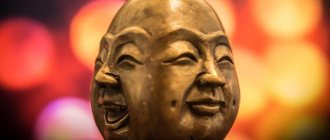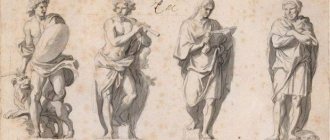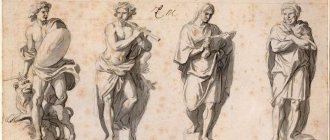In everyday life, when faced with the same situations, different people behave differently. The reason for this is not upbringing or the social environment, as it would seem, but the individual characteristics of the central nervous system. Scientists have long noticed that even in the diverse behavior of people there is something in common, certain patterns, types of response to the situation. In this regard, four types of temperament are distinguished: choleric, sanguine, melancholic and phlegmatic. What was the basis for this division? I addressed this question to Oksana Nikolaevna Chufistova, a senior lecturer at the Department of Medical and Biological Disciplines at Tomsk State Pedagogical University.
Definition of the concept
Called temperamentum in Latin, it is a combination of individual characteristics that characterize the sensory (affective) and dynamic spheres of his higher nervous activity (that is, comprehension, emotional reactions and behavior). This is a certain psychological foundation on the basis of which an individual develops and which determines a number of social properties of the psyche that contribute to the adaptation of people in society.
Historical reference
There was talk about temperament back in the 5th century BC. But only in the 18th century this issue was approached from a psychological point of view, having identified a number of stable qualities that are given to an individual by nature and directly affect his mental activity.
Teachings of Hippocrates
The founder of ideas about the innate characteristics of a person is considered to be this ancient Greek thinker and healer, who divided people into four substances predominant in the body: black and yellow bile, phlegm (mucus), blood. His follower was Claudius Galen, who listed the main types of temperament based on physiological differences.
Other concepts in the diagram
Over time, many researchers arose who devoted their work to the study of temperament.
Our days
There are 3 fields of psychophysical activity that are influenced by a person’s innate character traits:
- The level of overall intensity of interaction between the individual and the world. It can manifest itself in lethargy and passivity, excessive energy, or occupy an intermediate position between these extremes.
- Mobility. It is expressed in the speed and sharpness of movements and phrases. Accordingly, in this path people are divided into fast and slow.
- Emotionality. It is related to how often an individual’s emotional state changes, how susceptible and vulnerable he is.
Depends on temperamental characteristics
- The pace of work and the rhythm of life.
- The power of emotions, will, the ability to take control of psychological processes.
- Speed of perception, concentration, thinking.
- Discipline and self-discipline.
- Extroversion and introversion.
Doesn't belong to temperament type
- Character. It can change as we grow older, socially interact, and develop habits.
- Capabilities. This concept refers to how deeply, quickly and easily an individual masters new skills and knowledge and is not subject to natural behavioral characteristics.
Individual traits that are not subject to change are the basis for the development of human qualities and attitudes. These are peculiar superstructures that determine the methods of communication and behavior of an individual, but do not in any way affect whether a child grows up capable or not. However, knowing what traits predominate in this mental foundation of the baby, you can choose the most effective methods for his upbringing. As an adult, understanding which group you belong to will give you the opportunity to find effective tools and mechanisms for working on yourself.
If you are sanguine
You are lucky if you have this type of temperament. But don’t rush to rejoice: even here there is something to work on. It is better to correct the shortcomings in order to highlight your advantages more clearly. A visit to a psychologist or tests will help you find out your type of temperament (Isaac’s test can be taken online here).
How can a sanguine person work on his weaknesses?
So, the main disadvantages of a cheerful temperament:
- they easily give up on people;
- quickly get carried away by new ideas and people, forgetting about old promises;
- superficial judgments and actions.
If you are sanguine, learn patience. If you start a job, see it through to the end. While working, exclude all interfering factors: telephone, TV, music. Set as many goals as possible and achieve them, this will teach you discipline.
Don't forget the golden rule: an old friend is better than two new ones. Do not rush to cut off all ties with bored people and partners. Work on your relationships with your significant other and friends. Not everything in this world is done for you. Make an effort not to lose friendship and love.
Types of human temperament and their characteristics: comparative table of types
| Name | External signs | Features of speech | Specifics of communication |
| Choleric | Moving eyes, lips form a straight line, the gaze covers the entire space in which it is located. | Quick response to a question asked, as well as the overall pace of response. | In a conversation with several interlocutors, he strives to maintain eye contact with everyone and makes decisions hastily. |
| Sanguine | The corners of the mouth are raised upward, the angle of vision is wide. | Often switches from one topic to another, speaks fluently. | He tries to keep his gaze on each participant in the polylogue. |
| Phlegmatic | Looks as if deep into himself, the lip line is smooth and straight. | Slow, long pauses in conversation. | The gaze is directed only at the one to whom the phlegmatic person is directly addressing. |
| Melancholic | He looks more inward than at those around him, the corners of his lips are downturned. | The pace is average, there is uncertainty in the voice. | Maintains eye contact only with the person with whom he is currently speaking. |
Psychologist Daria Milai
Make an appointment
Health (psychosomatics) of choleric person
The liver and gall bladder are organs that choleric people should pay special attention to. Such a person is passionate, often acts impulsively, which is why he may suffer from bad habits. Alcohol and cigarettes are the most common ones. If a choleric person becomes addicted to them, it will be for a long time, which will have a very negative effect on his entire body.
heart problems and is also prone to high blood pressure .
Properties of temperament in psychology
- Extroversion/introversion. These concepts determine the dependence of the individual more on manifestations of the external world (extroverts) or on intrapersonal processes (introverts). The first include sanguine and choleric people, and the second - phlegmatic and melancholic.
- Speed of response. It includes the manner of speech, the speed of thinking, the intensity of gestures and facial expressions, and emotionality. It is clearly expressed in sanguine, choleric and melancholic types.
- Reactivity. In simple words - the degree of a person’s involuntary reaction to certain stimuli: criticism, harsh tone. People with an extroverted temperament have a strong and automated defense mechanism.
- Activity. Determined by the amount of energy resources of the body. It shows how a person overcomes life’s difficulties, how purposeful he is. In this understanding, phlegmatic people have the highest energy - they can maintain focus on one activity for a long time, do not overwork, but are slow to get involved in the process.
- Plastic. This is an indicator of how well an individual adapts to the outside world. Sanguine people are distinguished by highly developed adaptability.
- Emotional excitability. It depends on the minimum threshold of influence, which is sufficient for the appearance of emotion. It is elevated in everyone except phlegmatic individuals.
Disadvantages of a choleric person
Hot temper.
Emotional instability significantly spoils the lives of choleric people themselves and their loved ones. They are irritable and unrestrained, they can get angry over little things, and they can be aggressive. Their anger is uncontrollable , that is, in a bad mood they shout, insult, and may even start a fight.
However, often after their emotions subside, choleric people greatly regret what they said and did under the influence of surging feelings. They quickly cool down, forget grievances and do not strive to remember other people's mistakes.
All the feelings of a choleric person - positive and negative - are intensified. Anger is not their only strong emotion. They are jealous, passionate, equally uncontrollable in grief and in joy.
Haste.
The choleric type rarely thinks about the consequences of his actions before he commits them. He does not waste time weighing the advantages and disadvantages of a solution, but immediately runs to implement the idea. Because of this, he often gets into trouble, loses money, people's trust and good reputation.
The choleric person is inattentive, it is difficult for him to concentrate on one thing. He is used to scattering his attention on several things at once. At the same time, he always sees only the overall picture and does not strive to delve into details.
Irrationality.
Choleric people are illogical; they are accustomed to acting under the influence of a momentary impulse. Their emotions almost always prevail over reason. Because of this, they often forget about their health: they eat junk food or forget to eat at all, do not stick to their daily routine, etc. They can save money for a long time, and then spend it in a minute. They are often inattentive to their friends, and then complain that they have no real friendship.
Teachings of Pavlov I.P.
In fact, people who can clearly identify one specific type of temperament are rare. In most cases, we should talk about the predominant features inherent in one or another option, which are complemented by others in different proportions. For example, you may more often express yourself as a phlegmatic person, a little less often as a melancholic person, even less often as a choleric person, and in exceptional cases as a sanguine person.
Criteria for determining temperament
- The relationship between the processes of excitation and inhibition.
- Metabolic speed.
- The power of emotions.
- Features of physiological structure.
Based on 3 components
The research of the Russian scientist explains the manifestation of certain traits from a physiological point of view: in each representative a certain type of higher nervous activity (HNA) prevails, which indicates the existence of a predominant temperament.
Process characteristics
- Strength (S)/weakness (DC). Shows how long an individual is able to maintain performance under prolonged loads and stress resistance.
- Balance (U)/imbalance (N). How easily a person can remain calm in an emotionally provoking environment and control himself.
- Mobility (P)/inertness (I). The influence of inhibition and excitation, the predominance of one over the other.
Correlation of nervous system types
- Choleric - S-N-P.
- Sanguine - S-U-P.
- Phlegmatic - S-U-I.
- Melancholic - Sl-N-I.
Benefits of Choleric
Determination.
Cholerics are not used to putting things off until tomorrow. If they have the opportunity to do everything at once, they will definitely take advantage of it. Thanks to this quality, choleric people do not miss the chances that life gives them. They are often lucky, they achieve a lot and become successful.
A person with such a temperament is not afraid to take risks. On the contrary, he likes risk. It’s the same with change - a choleric person happily accepts everything new. He sees this as a competition, a test of his strength, another adventure and gamble.
Persistence.
If a choleric person decides that he needs something, he will not give up on his goal. Obstacles do not frighten him; if he fails, he will try to achieve what he wants again and again. Where others give up, he wins.
He is a workaholic, ready to give a lot to realize his dreams. He will not spare effort, time, money for what he really wants and what he sees as meaning. He does not need additional motivation - his desire alone will be enough.
Charisma.
The wit, strength, expressiveness, openness, and sometimes even naivety of choleric people attract people. They have enthusiasm, a sincere belief in victory and an infectious passion that allows them to inspire others and lead them.
If a person of this type learns to control his mood swings, he can become an amazing diplomat or public speaker.
Versatility.
Since representatives of the choleric temperament try to constantly be on the move, they often try new hobbies. This is not to say that they go deeply into each lesson. However, it is a fact that they have a wide variety of knowledge and skills.
Even within one day, choleric people manage to complete a dozen tasks of different, sometimes even opposite, plans. They switch between tasks easily and can multitask.
How to determine your personality type
Neurotic depression - what is it?
Determining your personality type is quite simple. To do this, you can use different methods and tests. In addition, to save effort and time, you can take them online. The main goal of such questionnaires is to understand exactly how a person will react to a particular situation.
To obtain objective results, psychologists recommend giving quick and clear answers. You don’t need to think a lot about solving this or that issue; you need to act depending on the emotions that arise first. It is worth noting that there are no right or wrong questions in such tests. There is no good or bad answer here.
Melancholic people can only work in a calm and familiar environment











